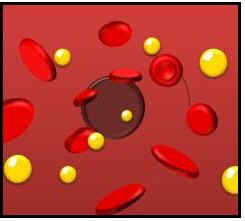Contents
High homocysteine problems
Why is it bad to have high levels of homocysteine in blood?
We remember that, as we said at the beginning, homocysteine is a toxic amino acid that circulates in the blood.
Elevated levels of homocysteine cause damage to blood vessels and nerve endings, deteriorating these structures. For this reason, high homocysteine levels increase cardiovascular risk and cause neurological damage.
Bad effects of high levels of homocysteine

It could be summarized that high levels of homocysteine:
- Increases the atheroma plaque, which leads to clogged arteries
- Accelerates cardiovascular disease (arteriosclerosis)
- Increases the risk of birth defects such as spina bifida
Homocysteine and cardiovascular risk
In studies conducted in the United States, Norway and the Netherlands, it has been shown that high levels of homocysteine in the blood are even more dangerous than the dreaded high cholesterol levels. That is why it has now been established that plasma levels high in homocysteine are a new independent cardiovascular risk factor.
Having high levels of homocysteine is a cardiovascular risk factor.
What are the bad symptoms or negative consequences of high homocysteine levels?
High levels of homocysteine are very toxic and can cause irreversible damage, especially at the neurological level, in children. In adults, usually the treatment, consisting of a healthy diet and the necessary supplements, can reverse the damage caused. The symptoms of high homocysteine are:
- Bad circulation: formation of atheromatous plaque, thrombosis.
- Neurological symptoms: memory loss, depression, loss of sensation in the extremities, neuropathy , dementia
- Specific symptoms of B12 and B9 deficiency: anemia, fatigue, weakness, irritability, neurological problems, tingling, etc.
Who is at risk of high homocysteine values?

Due to the metabolic processes involved with this amino acid, it is known that the following population groups may have a high risk of high homocysteine levels:
- Smokers: Tobacco increases the levels of homocysteine in blood considerably and decreases the levels of vitamin B9 and B12.
- Consumption of alcohol, especially distilled spirits such as vodka, whiskey, etc.
- Treatments with medicines that reduce vitamins B12, B9 or B6: stomach protectors, heart diseases, medicines for Parkinson ‘s, etc. It is recommended that these people take vitamin B12 and B9 supplements.
- Patients with Parkinson’s disease due to side effects of the medications (previous point)
- Vegetarians and long-term vegans, if they do not take vitamin B12 supplements.
- Nutrigenetics: some people have a genetic predisposition to have lower levels of vitamin B9, which leads to increased homocysteine. These alterations are detectable with a nutrigenetics test and easily treatable with a diet richer in foods rich in vitamin B9, such as avocado or spinach.
- Diseases of the kidneys
- Deficiency of vitamins B12, B9 or B6 due to other causes: For example, people who do not consume enough vegetables and who do not have folic acid or vitamin B9 (due to allergies, intolerances, or simply low consumption) may have vitamin B9 deficiency. . People with intestinal diseases that impair proper absorption also have this risk. The lack of vitamin B6 makes it impossible for homocysteine to be recycled into cysteine.
- Excessive consumption of animal protein: Animal protein much richer in methionine than vegetable protein. For this reason an excess of meat in the diet can lead to high homocysteine problems.
Note: The information included in this article summarizes the latest scientific evidence from studies in which the levels of homocysteine, vitamins B12 and B9 have been measured in thousands of people, in which their risks and consequences for health have been evaluated.
![]() More information on homocysteine
More information on homocysteine








